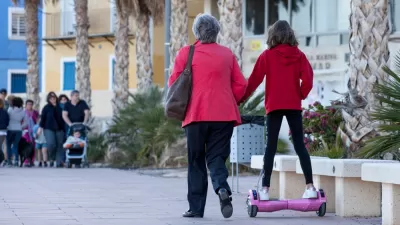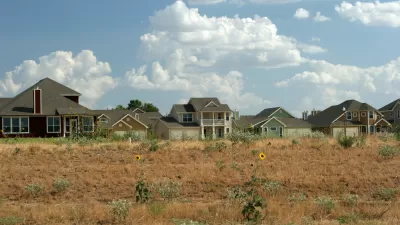Analysis shows that Atlanta is building a lot of new rental units, but most are priced at luxury levels, while the city's supply of low cost rental units are shrinking in the neighborhoods they're needed most.
Georgia Tech Professor Dan Immergluck has completed a study finding that Atlanta's supply of "low-cost units" (i.e., units that rent for less than $750 a month) is shrinking by 4.4 percent every year, reports Thomas Wheatley.
Immergluck's analysis finds no shortage of luxury units. According to his analysis, the city currently totals 11,000 units under construction, with another 9,000 proposed. Ninety-five percent of the rental units built between 2012 and 2014, however, were luxury units.
Meanwhile:
"Immergluck found that 70 census tracts, more than half of the census tracts in the city, saw a 'measurable decline in low-cost units, while only 27 tracts saw measurable gains (the remaining tracts saw no measurable gain or loss). More importantly, only 14 tracts saw gains of more than 50 units, while 52 tracts saw losses of more than 50 units, with 26 of these experiencing losses of more than 100 units.' Neighborhoods with relatively high poverty rates tended to see the highest declines and increases in low-cost rental units, Immergluck found."
To counter the trends in luxury and affordable units around Atlanta, Immergluck supports a city proposal for inclusionary zoning as well as spending of public money to construct and rehabilitate truly affordable units.
FULL STORY: Analysis: Atlanta has plenty of new luxury apartments... but 'low-cost rentals' are dwindling

Alabama: Trump Terminates Settlements for Black Communities Harmed By Raw Sewage
Trump deemed the landmark civil rights agreement “illegal DEI and environmental justice policy.”

Planetizen Federal Action Tracker
A weekly monitor of how Trump’s orders and actions are impacting planners and planning in America.

The 120 Year Old Tiny Home Villages That Sheltered San Francisco’s Earthquake Refugees
More than a century ago, San Francisco mobilized to house thousands of residents displaced by the 1906 earthquake. Could their strategy offer a model for the present?

In Both Crashes and Crime, Public Transportation is Far Safer than Driving
Contrary to popular assumptions, public transportation has far lower crash and crime rates than automobile travel. For safer communities, improve and encourage transit travel.

Report: Zoning Reforms Should Complement Nashville’s Ambitious Transit Plan
Without reform, restrictive zoning codes will limit the impact of the city’s planned transit expansion and could exclude some of the residents who depend on transit the most.

Judge Orders Release of Frozen IRA, IIJA Funding
The decision is a victory for environmental groups who charged that freezing funds for critical infrastructure and disaster response programs caused “real and irreparable harm” to communities.
Urban Design for Planners 1: Software Tools
This six-course series explores essential urban design concepts using open source software and equips planners with the tools they need to participate fully in the urban design process.
Planning for Universal Design
Learn the tools for implementing Universal Design in planning regulations.
Clanton & Associates, Inc.
Jessamine County Fiscal Court
Institute for Housing and Urban Development Studies (IHS)
City of Grandview
Harvard GSD Executive Education
Toledo-Lucas County Plan Commissions
Salt Lake City
NYU Wagner Graduate School of Public Service





























